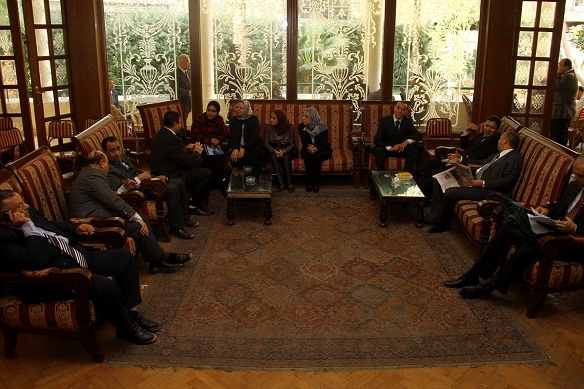I don’t present stories to pass time, Arabic Booker prize-winner Youssef Ziedan says. “Through my texts, I extend an invitation to the reader to partake in forming a kind of consciousness. I don’t offer answers either; I present beehives that sting; that make honey and wax.
Ziedan, one of Egypt’s most venerated historians, penetrated popular consciousness in 2008 with his best-selling sophomore novel “Azazeel; a highly controversial work that explores a dark chapter in the Coptic Church’s history that remained largely disguised until last year.
Ziedan sat down with Daily News Egypt earlier this week to discuss his literary career, his reaction to the Coptic Church’s position on his novel and future projects.
Ziedan said that the research process for “Azazeel – which centers on the philosophical battles between an Egyptian Coptic monk with the devil in the fifth century – took 20 years but the writing itself took about a year.
“At first, I wanted to write a novel about a Sufi and his relation to the truth, he said. “This was in my 20s, but then I deferred this project until I possessed the tools for mastering Sufi language; until I could develop this language to speak in a contemporary voice.
Ziedan didn’t expect the massive success that met his second novel, especially since hardly any mainstream publications reviewed the book in the first five months after it was released. Ziedan believes that the Egyptian bloggers, who pushed mainstream media to discuss the book by breaking the silence over it, are the ones to thank for the success of “Azazeel, calling their reviews “more worthwhile than everything that followed.
“In my opinion, the themes discussed in ‘Shadow of the Serpent’ are more crucial. The short novel is a study of the transformation the female image has gone through in the vast Egyptian tradition “from the horizon of a sacred female to the dungeons of soiled women.
Ziedan spoke of the historical transformation the image of the serpent has undergone that mirrors the distortions of the female image. Before, he says, the serpent was regarded as a worshipped goddess. Now, it’s become mostly reviled; always linked to the devil.
He attributes these changes to ancient economical issues and military factors that came with empire building during the early history of the Middle East. He also blamed religion, embodied first in the Torah, which caused the downgrading of the female image.
“The picture the Torah paints of the woman is a harsh one compared to what was before it.
Answering to whether his Sufi studies and writing influenced the formation of the truth-seeking Hypa, the protagonist of “Azazeel, Ziedan said that Hypa is, above all, a human being.
“The human experience is one but it takes different forms in different cultures, languages, and heritages. “
“Azazeel has stirred controversy among the Coptic community for its portrayal of a brutal Church and the sexual escapades of Hypa the monk. Contrary to popular belief, Ziedan asserted that neither Pope Shenouda nor the Holy Synod discussed the novel or issued any official statements.
He added that the novel’s two main opponents, Bishop Bishoy (Secretary of the Holy Synod) and father Abdelmaseeh Baseet, don’t represent the church and that they’re only voicing personal opinions.
Expounding on his earlier contentious comment “as long as religions last, violence will persist, Ziedan explained there is a major difference between religion and religiosity.
“Religion is a text, but religiosity is a tradition which, in any religion, necessarily includes mechanisms for violence or for using god to perform or justify violent acts, he said.
“We will not be saved from this unless we examine this religious heritage and its legislating methods and not the religion’s origin. The key texts of religions are quite limited.
“An important part of religiosity entails one to presume he is right while others are wrong. This gives him the right to speak in the name of god and he might be merciful or he might resort to killing, he explained.
“For example, in Upper Egypt, Muslims don’t let women inherit land. Their tradition is stronger than the religious text. When you compare the manifestations of the religious acts with their origin in religion, you find them very different from each other.
“As long as this [religiosity] continues, violence will persist, and I think violence will persist for a long time since there doesn’t seem to be an end to this. It’s difficult for the religious experience to purge itself from its inheritance.
Ziedan’s future projects include a book that delves deeper into this provocative subject: “Al-Lahoot Al-Arabi wa-Osol Al-Onf Al-Deeni (Arabic Theology and the Origins of Religious Violence) comes out in few weeks.
His third novel “Al-Nabati (The Nabatean) though brings another little-known historical period to the forefront. The Nabateans are Arab tribes that enjoyed a great pre-Islamic civilization. Their remains can be seen in Petra in today’s Jordan, and the Arabic Nabati font originates in their writings.
Ziedan’s highly anticipated novel throws light on the exciting role the Nabateans played in the Muslim takeover of Egypt.
